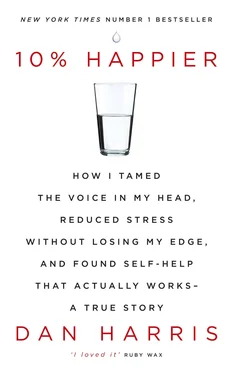The next day, I slinked back upstairs and dropped it off with his secretary, all the while thinking: This is what it’s come to. I’m the crazy guy handing out religious tracts on the street.
I still wanted to talk about this stuff, though, to people I liked and trusted. It wasn’t that I felt compelled to convert anyone; I just wanted a sounding board. Figuring that this would be easier with someone who wasn’t my boss, I broached the subject at a dinner with my friend Regina. For a decade, Regina and I had been having no-holds-barred debates about everything from TV shows to New York real estate to my sometimes questionable, pre-Bianca romantic decisions. I figured the machinery of the ego would be terrific fodder. Moments after I started blathering about Eckhart Tolle, however, Regina cut me off. “Whatever, Dan. If you need this, fine.” Then she changed the subject to which soups we should order. The verdict was rendered with such offhand ferocity that it made me realize that this topic I thought so alive with potential could come off as merely fuzzy and embarrassing. She wasn’t engaged enough to even needle me about it.
My losing streak continued at a family brunch, when I floated Tolle past my younger brother. I should have seen this one coming. Matt’s mission in life since emerging from the womb had been to torment me. Even though he was now a venture capitalist and the father of a beautiful baby girl, his devotion to puncturing my balloon had not diminished. As soon as I finished my spiel, he just stared back at me with a satisfied smirk. The knife inserted with nary a word. (Not long afterward, he gave me an Eckhart Tolle calendar for Christmas. I unwrapped it, looked up, and saw him on the other side of the room, wearing the same smirk.)
What made this series of failures especially frustrating was the realization that the expressions on the faces of my interlocutors were probably not dissimilar to the way I must have looked when confronted with some of the fringier religious people I’d interviewed over the years.
Even with people who weren’t reflexively hostile to the material, I wasn’t making terrific inroads. At a group dinner downtown, I cornered my friend Kaiama, an open-minded professor of French Lit at Columbia. As I concluded my discourse on the Now, she asked, “But how do you really stay in the moment when it’s always slipping away?” I had no answer.
Perhaps the most meaningful exchange I had on the subject was a completely random discussion with my uncle Martin at my parents’ annual summer pool party. Martin, a former entrepreneur who was now in the early stages of Alzheimer’s, turned to me and asked an intriguing question: “Which is more exciting to you? Reality or memory?” I paused, considered it, and said, “I wish I could say reality, but it’s probably memory.” And then I asked, “What about you?” At which point Martin stared blankly back at me and asked, “What was the question?”
Bianca was mildly receptive to my newfound area of interest. Mostly, she was intrigued by the notion of having a less stressed husband-to-be. Then again, I had just come through a yearlong obsession with climate change. It was reasonable to assume that this was just another of my transient fixations, only kookier.
I was stuck in the same place I’d found myself at the end of my Tolle interview, knowing my hair was on fire but lacking an extinguisher. With Tolle having failed to answer my questions, and struggling with an ongoing inability to explain what intrigued me about all of this in even the most basic, comprehensible terms, I was at my wit’s end. I didn’t know where to turn. I recalled what Chopra had said to me at the end of our interview: “Hang around with me.” Just days after I met him, he’d sent a whole stack of his books to my office, with titles like The Book of Secrets and Reinventing the Body, Resurrecting the Soul . He’d been texting and emailing me, and even forwarding me a Google Alert he’d set on himself, in which Kim Kardashian sang his praises. Warily, I figured: What do I have to lose?
Deepak was wearing a black T-shirt emblazoned with a peace sign made out of sequins as he enthusiastically showed me around the Manhattan outpost of the Chopra Center. Located in a chichi midtown hotel, the Center offered spa treatments, medical consults, yoga, and astrological readings. We were in the gift shop. As I let my eyes fall on his vast array of personally branded products (Ayurvedic Cold & Allergy Remedies, Antioxidant Supplements, “Harmonizing” necklaces, shirts printed with the word abundance, and books (fifty-five or fifty-six of them, he couldn’t remember exactly—on everything from God to golf to cooking) I was thinking about Jay Z, who once rapped, “I’m not a businessman . . . I’m a business, man.”
Felicia and I had decided to profile Deepak for Sunday World News . It didn’t take a lot of convincing to get him on board, and it became readily apparent how this man had landed on the Forbes list of richest celebrities, with an estimated income of $22 million a year. His itinerary was a manic, many-splendored thing. In just a few days I personally saw him host a satellite radio show, hold meetings with video game developers for a project based on his spiritual teachings, and discuss a Broadway show with a man who claimed he could bend spoons with the power of his mind.
On many levels, Deepak seemed like a walking contradiction. He claimed to be perennially present, and yet we filmed him pounding down the street while furiously typing on his BlackBerry, and then voraciously devouring articles on his Kindle while ostensibly working out on an elliptical machine. These didn’t strike me as the actions of a man living in perfect harmony with himself; this was the type of shit I did.
We did an interview at a picnic table in Central Park, and I challenged his self-proclaimed imperturbability. Thinking back to his performance at the Face-Off, I said, “Sometimes I’ve seen you worked up.”
“But even though I was worked up,” he responded, “did you find that there was anger, resentment, or hostility in that?”
“I can’t read your mind, but judging from your body language, you weren’t pleased.”
“Without passion, you’d be a walking dead person,” he said. “Even though you’re dynamically engaged, you’re not stressed.”
Was it really just “dynamic engagement” and not stress? Deepak insisted that, in fact, he hadn’t experienced stress in decades. He told me that, years ago, when he was a frazzled young medical resident in suburban Massachusetts he smoked two packs of cigarettes a day and drank too much. “We used to take care of a cardiac arrest and then we’d go outside and smoke a cigarette,” he said. But then, quite suddenly, he changed everything. “It was dramatic,” he told me. “I finally one day made a decision that that part of my life was over. I said, ‘I’ve been there, done that.’ ”
He quit his day job and went to work for the Maharishi Mahesh Yogi, the bearded Indian holy man perhaps most famous for his stint as the official guru of the Beatles. (After a brief stay at his ashram, John Lennon left in a huff over allegations that the Maharishi had tried to fondle Mia Farrow. On his way back to London, Lennon wrote the song “Sexy Sadie,” featuring the lyric, “What have you done? You’ve made a fool of everyone.”) Deepak climbed to the rank of the Maharishi’s top lieutenant. But he and the Maharishi grew apart. Deepak started feeling like the group had become too cultish; the Maharishi thought Deepak too ambitious. So Deepak left.
Unleashed from hierarchical constraint, Deepak spread his wings. He’d become intrigued by “spontaneous remissions,” those dramatic and inexplicable recoveries, where people bounce back from serious illnesses. When he couldn’t get any reputable medical journals to publish his research, he paid a vanity press five thousand dollars to put it out as a book. It was a hit. Scores more followed. He became friends with Michael Jackson, who introduced him to Oprah, who put him on television. The rest was history. By the time I met Deepak, he was sixty-three years old. He’d recorded an album of freaky New Age music with Martin Sheen, Madonna, and Demi Moore; Lady Gaga had called him the most influential person in her life; Time had dubbed him “the poet-prophet of alternative medicine.” He had fierce critics, though. The publisher of Skeptic magazine put Deepak on the cover, lampooning his medical conclusions as “mostly wild speculations based on only the slimmest of evidence.”
Читать дальше












